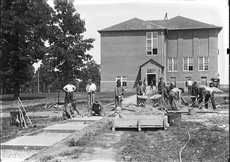
Tech will celebrate on Nov. 18 the 100th anniversary of Dixie College, the first undergraduate institution established on the University grounds.
“We look forward to holding a couple of ceremonies on the Quad that day to celebrate,” President Bob Bell said.
Scheduled activities for the day include the sealing of a University time capsule and a speech presented by a well-known Tech alumnus.
“We expect Representative Lincoln Davis to be our speaker, and we have invited a lot of other dignitaries, including members of Congress,” Bell said.
“Elementary and middle school children from the area have also been invited to attend this celebration. Dixie College was about furthering the education of the whole Upper Cumberland. And I’m happy to say we have maintained that really close relationship with the schools, even as a university.”
The month-long celebration offers students the opportunity to learn more about their home-away-from-home. With currently strained parking conditions and residential situations, it’s easy to become overwhelmed by the University’s growth, not elated by it.
“In the days of Dixie College, students didn’t have cars. Many didn’t even have the money to feed themselves,” Bell said. “So it’s important to understand the vision they had – the commitment those seven or eight men had, and how they changed this region with that vision.”
The state approved Dixie College’s creation in 1909 as a church-supported school. But the school struggled with inadequate funding and low enrollment.
By 1915 the school was turned over to the governments
of Cookeville and Putnam County in order to attain enough funds to remain open. Governor Thomas Rye signed the act that created Tennessee Polytechnic Institute on March 27, 1915.
The school opened its doors in 1916 with only 13 professors and 19 enrolled students, according to the History and Traditions page of the University Web site. From 1916 to 1924, Tennessee Polytechnic only offered classes at high school and junior college levels. But by 1929 the State Board of Education authorized a complete college program and the first class of four-year graduates received bachelor’s degrees that June.
The five schools of study that made up the Polytechnic Institute were reorganized into colleges in 1965, when Tennessee Polytechnic Institute gained university status, becoming Tennessee Technological University.
“Whether you’re an engineering major from Florida or an English major from Middle Tennessee, it’s important to understand the heritage of your university,” Bell said.
Each year University enrollment continues to grow. And the students who graduate the ever-expanding University exemplify what a Tech diploma and initiative can afford you.
According to the History and Traditions page, among the 65,000-plus men and women who have received degrees from Tennessee Tech are the former president of Boeing Corp., a two-time space shuttle astronaut, an NFL pro-bowl player, a New York Times assistant managing editor, a country music superstar, and a four-star general.
All students, faculty and staff are invited to attend the celebratory event to commemorate the establishment of a tiny school turned influential university.
Tech to release commemorative book
The Dixie celebration will also serve as a University fundraising campaign.
Practical Work: Dixie College to Tennessee Tech University, 1909-2009 is scheduled for release in mid-November to commemorate the establishment of the college.
“Susan Elkins, Calvin Dickinson and I, along with 35 to 40 other members of the Tech family, contributed to the book,” Bell said.
Alumni Relations sponsored the cost of the commemorative book, and proceeds from the sale will benefit the office for the purpose of funding alumni scholarships and meetings.
A copy of Practical Work will be encased in the time capsule alongside a letter from President and Mrs. Bell, a golden eagle pin, a Tech flag, and a variety of other University artifacts.


